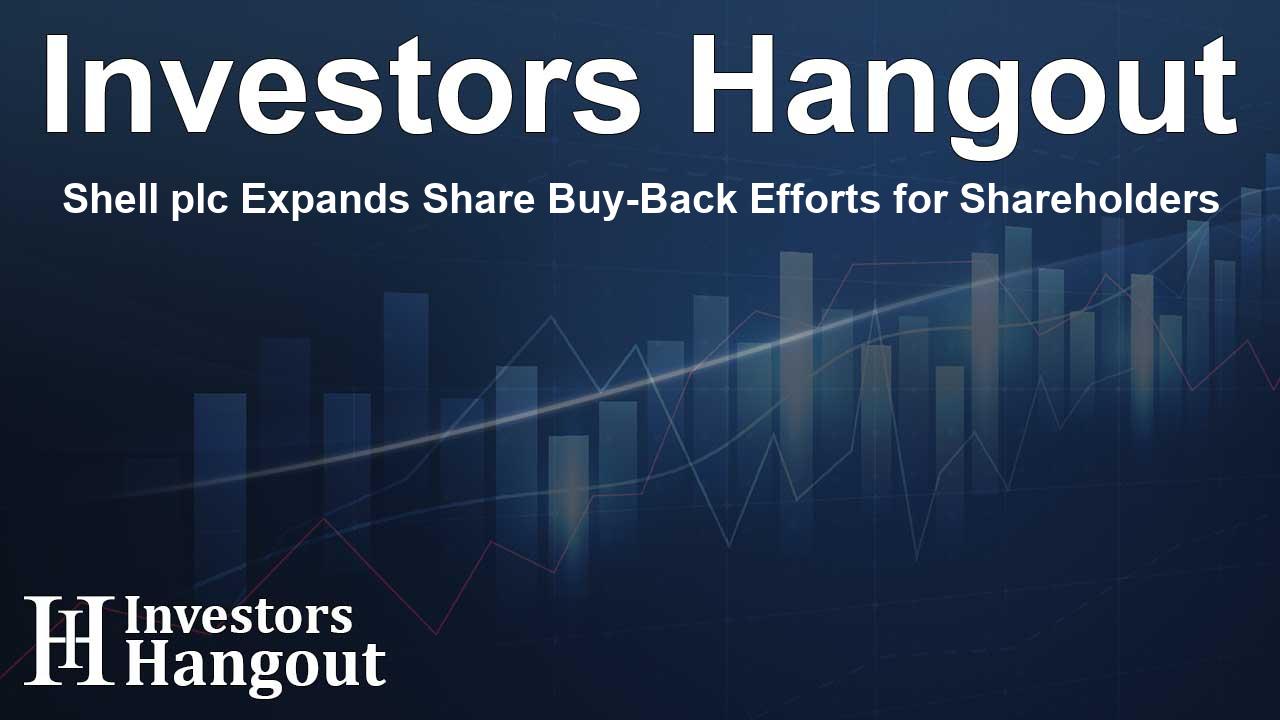Shell plc Expands Share Buy-Back Efforts for Shareholders

Shell plc Engages in Strategic Share Buy-Back Program
Shell plc, the global energy giant, recently took significant steps in managing its capital by actively participating in a share buy-back program. This initiative aims to enhance shareholder value and demonstrates the Company’s commitment to returning capital to investors. On a notable day, Shell announced the acquisition of a substantial number of its shares for future cancellation, contributing to a proactive approach in share management.
Details of Recent Share Transactions
On a specified date, Shell executed transactions involving shares purchased across multiple trading venues. The aggregated data showcases the volume and pricing movements associated with these trades. Investors will appreciate the transparency of this initiative as the company has disclosed critical aggregated information about the shares bought back:
Aggregated Share Purchase Information
During the recent purchase, 1,650,000 shares were acquired at an average price that reflects the strategic planning behind these transactions. This careful timing and execution were crucial for maintaining market stability and providing liquidity.
Purchases Across Various Venues
Shell not only achieved success on the London Stock Exchange (LSE) but also made strategic transactions on other platforms such as Chi-X and BATS. By diversifying its trading venues, Shell ensures that it captures the best prices available while maintaining a robust buy-back program.
Program Overview and Execution Strategy
This buy-back initiative is part of a larger strategy that was initially communicated to shareholders previously. Shell enlisted Citigroup Global Markets Limited as an independent trading partner to execute these transactions. This allows for an objective execution of the strategy respecting both on- and off-market conditions, likely ensuring that market operations are efficient and beneficial for the shareholders.
On-Market and Off-Market Transactions
Shell’s program includes both on-market and off-market purchases, each conducted under specific pre-set parameters. The company's authority to repurchase shares enhances flexibility and demonstrates meticulous planning. These decisions align with the company’s broader approach to financial management and shareholder engagement.
Compliance with Regulations
As part of the buy-back program, Shell operates in full compliance with stringent regulations set forth by the UK Listing Rules and the Market Abuse Regulation (MAR). Such guidelines ensure that Shell adheres to the highest standards of corporate governance and transparency, reinforcing investor confidence in the Company’s operations and financial decisions.
Regulatory Breakdown
The transparency in reporting individual trades made on behalf of the Company is in accordance with the MAR, which provides reassurance to stakeholders about Shell’s commitment to ethical trading practices. This kind of oversight is essential in maintaining trust and integrity in the market.
Future Outlook for Shareholders
Looking ahead, Shell’s share buy-back program signifies a strong alignment between the Company’s strategic goals and its duty to enhance shareholder value. By continuing its proactive measures in share management, Shell is set to maintain a positive trajectory for its investors, ensuring that they remain a priority in the company's financial decisions.
Continued Engagement and Communication
Shell is dedicated to maintaining open lines of communication with its investors. The Company has made it clear that it is willing to adapt based on market conditions and investor sentiment, indicating a responsive approach to corporate governance. Stakeholders are encouraged to stay informed about future activities related to share buy-backs and other significant corporate developments.
Frequently Asked Questions
What is Shell plc’s share buy-back program?
Shell plc’s share buy-back program involves the Company repurchasing its own shares from the market to enhance shareholder value and optimize its capital structure.
How many shares were recently purchased by Shell plc?
Shell plc announced the purchase of approximately 1,650,000 shares as part of its recent share buy-back initiative.
What are the benefits of a share buy-back program?
Share buy-back programs can enhance shareholder value by reducing the number of outstanding shares, which often leads to increased earnings per share (EPS) and share price appreciation.
Which trading venues were involved in the recent share purchases?
The recent share purchases were conducted on the London Stock Exchange (LSE), Chi-X, and BATS, among others.
How does Shell ensure compliance with financial regulations?
Shell plc adheres to the UK Listing Rules and Market Abuse Regulation (MAR), ensuring that its share buy-back operations comply with necessary legal standards and maintain transparency.
About Investors Hangout
Investors Hangout is a leading online stock forum for financial discussion and learning, offering a wide range of free tools and resources. It draws in traders of all levels, who exchange market knowledge, investigate trading tactics, and keep an eye on industry developments in real time. Featuring financial articles, stock message boards, quotes, charts, company profiles, and live news updates. Through cooperative learning and a wealth of informational resources, it helps users from novices creating their first portfolios to experts honing their techniques. Join Investors Hangout today: https://investorshangout.com/
Disclaimer: The content of this article is solely for general informational purposes only; it does not represent legal, financial, or investment advice. Investors Hangout does not offer financial advice; the author is not a licensed financial advisor. Consult a qualified advisor before making any financial or investment decisions based on this article. The author's interpretation of publicly available data shapes the opinions presented here; as a result, they should not be taken as advice to purchase, sell, or hold any securities mentioned or any other investments. The author does not guarantee the accuracy, completeness, or timeliness of any material, providing it "as is." Information and market conditions may change; past performance is not indicative of future outcomes. If any of the material offered here is inaccurate, please contact us for corrections.